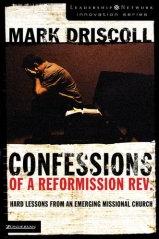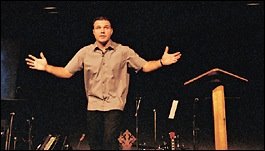Wrap-up: Confessions of a Reformission Rev (Driscoll)
 As I mentioned on Friday, I don't feel fit to dip my toes into the whirlpool of conversation that's started re: Mark Driscoll's book Confessions of a Reformission Rev. If you're here looking for a real, eloquent review and analysis, you might want to just browse this article and click on the links to other smart people.
As I mentioned on Friday, I don't feel fit to dip my toes into the whirlpool of conversation that's started re: Mark Driscoll's book Confessions of a Reformission Rev. If you're here looking for a real, eloquent review and analysis, you might want to just browse this article and click on the links to other smart people.Still, I've committed to summing up the books I read (for my own journaling purposes) and so I can't skip this either.
Mark Driscoll planted and pastors the upstart Mars Hill Church is Seattle, WA. Mars Hill has grown by leaps and bounds, and its pastor has become something of a lightning rod in the evangelical world. More on that later. Confessions is a honest, vulnerable chronicle, part church-biography and autobiography, of the steps and mis-steps in the growth of Mars Hill Church.
The most likely audience for this book are young, bright-eyed, potential church-planters. For these people, I think this book has a tremendous amount to offer. The issues that have confronted Mars Hill are certainly not atypical and prospective pastors do well to wrestle with them now. I think that there is a 'blissful ignorance' that could easily surround people diving into ministry (speaking of myself, here) and it's nice to have your eyes shocked open to the truth. At one early point, a particularly troubling encounter in a Mars Hill service led to this:
I called our people to join in our mission to follow Jesus into war for the heart of our city and closed in prayer. I wept in front of my church for the first time as the magnitude of what we were doing hit me at a level deeper than ever before. I had never opened my eyes while I prayed before our church, and for the first time, I prayed with my eyes open... My people had their heads bowed in silence, and it absolutely broke me to know that these people were entrusted to my leadership and care. (p87)
In his T4G address (that I've raved about previously), John Piper reminded the assembled pastors that the mantle of preaching "is soaked in the Blood of Christ and singed in the fires of Hell". Are pastors, elders, or church planters wearing that mantle? Driscoll writes honestly about the increasing sense of that weight in his development as a pastor... Such sobering realism is sorely needed.
Driscoll also speaks with great conviction re: his committment to the authority of the Bible and the necessity of Biblical preaching. Given Driscoll's visability in evagelicalism and respect from emerging/emergent types, it is encouraging to see these embattled doctrines championed loudly and clearly.
In the end, I decided not to back off from a preaching monologue [in favor of discussion, as some members has suggested] but instead to work hard at becoming a solid long-winded, old-school Bible preacher that focused on Jesus. My people needed to hear from God's Word and not from each other in collective ignorance like some dumb chat room. (p.77)
Two other particularly helpful points: First, Driscoll devotes a large number of pages to outlining the defining of Mars Hill's elder-driven ecclesiology. Obviously, I also admire Driscoll's sense of the church mission. Driscoll mentions that he "decided to never view our church as a church but rather always ... like a church planter with a core group launching out to reach the city" (p.147). While we must focus on building into those who sit inside our four walls every Sunday, we mustn't forget the mission for which they need to be equipped. If we forget the world outside our 'holy huddle', we are not serving Christ.
 As someone who has considered church-planting, I found Confessions to be challenging and enlightening. Though the chapters essentially follow Mars Hill's growth, it's apparent that considering many of Mar Hill's later challenges earlier would save a lot of headaches.
As someone who has considered church-planting, I found Confessions to be challenging and enlightening. Though the chapters essentially follow Mars Hill's growth, it's apparent that considering many of Mar Hill's later challenges earlier would save a lot of headaches.Now, just a couple words about the swirling controversy re: Driscoll's acerbic wit and vocabulary... First, I'm certainly not the right person to define the dividing line between acceptable, though 'shocking', language and full-blown vulgarity. After all, I went to a state college, was in a fraternity, and worked as a musician. Similar to Ralphie's dad in A Christmas Story, "[I] worked in profanity the way other artists might work in oils or clay. It was [my] true medium..." I can remember mouthing off about various four-letter things in Denny's and thinking nothing of it.
When I hear kids around talking that way now, I cringe... not particularly because the speech offends me, but because I see now how immature and crass we must've sounded back then. Similarly, I don't find myself offended at the vast majority of what Driscoll says, but his choice of words certainly seems to reflect a degree of immaturity and sophomoric humor could reflect poorly on him and on the Gospel. Driscoll seems to get this and has repented and apologized for his mouth in the past. I wonder how many of us would be so vulnerable and honest re: our sin?
I grew up in a generation of kids who used 'the f-word' as a substitute for periods in our grammar. I know many people continue that pattern of speech in adulthood. While that might be normative or accepted in society, we as Christians are called to be holy - separate and distinctive from the world around us. Some argue that talking like everyone else gets us a 'better hearing'. While that may be true, such a presentation ensures there's no way to avoid the message being clouded.
God is pure and holy. Our speech, likewise, should be above reproach.
All that said, we must be careful that we don't necessarily allow our shock at a choice of words to brand it as profane. One person commented that they were 'appalled' that Piper used the word 'asinine' in a sermon. I think that's a level of sensitivity that's as over the top (though in another direction) as Driscoll's unruly tongue.
So, if you're looking to get a real picture of the struggles of a new church with a young pastor I can honestly say this book delivers. However, be aware that there are sections that will make you shake your head... "Man, I wish he hadn't taken it that far..."
Labels: Books

3 Comments:
I was tempted to put some snarky comment (not directed at you, but the language police), but I'll just say that yours was a good review, as well as being gracious and honest.
By Anonymous, at 6:25 PM, May 22, 2006
Anonymous, at 6:25 PM, May 22, 2006
I was tempted to put some snarky comment...
Well, glad you restrained yourself... I'm not eager to break out my censorin' stick. ;-)
By HeavyDluxe, at 10:18 PM, May 22, 2006
HeavyDluxe, at 10:18 PM, May 22, 2006
Just finished this one, and as a potential planter, I loved it.
By Unknown, at 7:33 PM, May 26, 2006
Unknown, at 7:33 PM, May 26, 2006
Post a Comment
<< Home